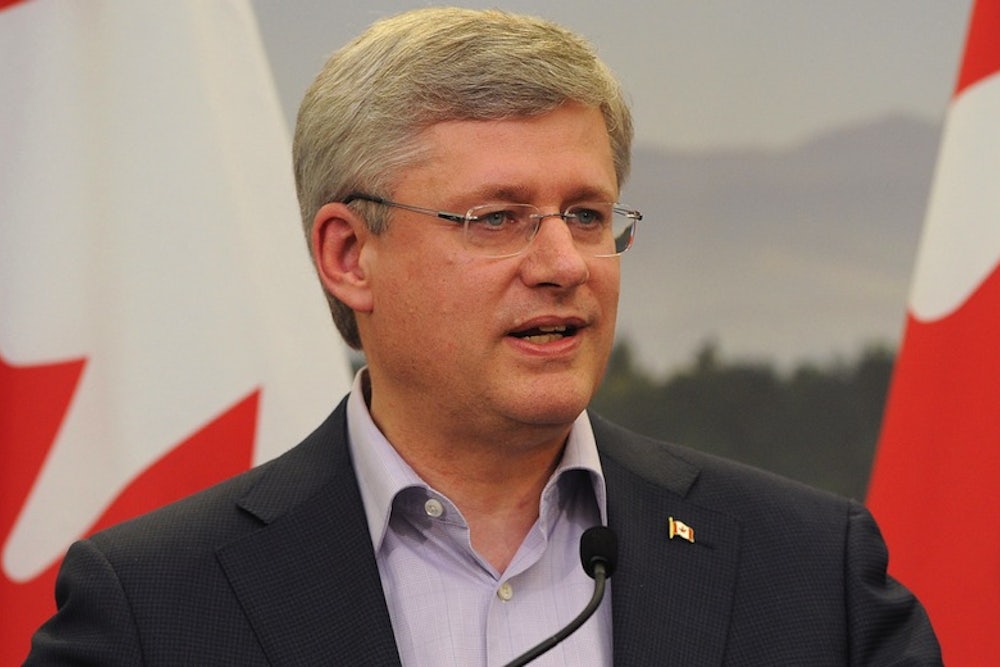Two years ago, scientists with the Canada Ice Service agency wanted to give a press conference about the Arctic’s sea ice, which had shrunk 70,000 square miles below its last record in 2007. The scientists needed federal approval from nine different levels, including the director of the Ice Service and the environment minister’s office. The event never happened. As new documents obtained by Canada’s Postmedia News show, it was cancelled by "ministerial services," the sixth level of approval. No explanation was given.
“Why is it that we need nine levels of approval for this sort of thing, what’s the justification,” biologist and Evidence for Democracy co-founder Scott Findlay said.
This is just the latest example in a years-long effort by Prime Minister Stephen Harper’s administration to silence climate scientists within its own government. Since taking office in 2006, Harper has tightened control over what scientists tell the press, and when. A leaked internal analysis from Environment Canada in 2010 found that media coverage and requests on climate change fell sharply over three years. "Media coverage of climate change science, our most high-profile issue, has been reduced by over 80 per cent," the document said. Critics note that government communications staff has grown 15 percent under his watch. Meanwhile, Harper has phased out science positions, like the National Science Advisor in 2008.
The restrictions affect scientists across all subjects. In 2011, the head of molecular genetics for the Department for Fisheries and Oceans published research on the declining salmon population, but the Privy Council Office, which advises the prime minister, refused to let him to talk to the press about it. In 2012, Ottawa Citizen’s Tom Spears contacted both NASA and Canada’s National Research Council in 2012 to request information for a story about snowfall. A report from the Environmental Law Center documents how NASA responded within 15 minutes, but it took eleven Canadian federal employees 50 emails to decide whether the journalist’s story would be “positive/informative.” Eventually, the reporter received “approved lines." And earlier this year, federal meteorologists were ordered not to discuss climate change in their coverage of extreme weather. The reason, an Environment Canada spokesman told journalist Mike De Souza in May, is that meteorologists are only experts in “their field of severe weather,” so “climate change or long-term trends would be directed to a climatologist or other applicable authority.”
A survey commissioned by the Professional Institute of the Public Service of Canada last year found only 10 percent of federally employed scientists felt they could speak freely about their agency work. And the muzzling has succeeded: Federal scientists are rarely quoted in the Canadian media's coverage of climate change, forcing reporters to rely on quotes and information from watchdog groups and U.S. scientists. Whether that changes may depend on the outcome a complaint filed last year by the Environmental Law Center and Democracy Watch alleging that the "federal government is preventing the media and the Canadian public from speaking to government scientists for news stories—especially when the scientists' research or point of view runs counter to current Government policies on matters such as environmental protection, oil sands development, and climate change." The Information Commissioner, the office that oversees access to government information, is evaluating the complaint.
Harper's antagonism toward climate-change experts in his government may sound familiar to Americans. In 2006, a long list of media outlets found President George W. Bush’s administration was suppressing U.S. climate scientists at the National Oceanic and Atmospheric Administration and NASA by requiring media requests to go through the White House's Council on Environmental Quality for approval. An eventual House Oversight and Reform Committee report accused his administration of controlling the “dissemination of scientific views that could conflict with Administration policies.” This prompted an investigation from NASA's inspector general that found political appointees in NASA's public affairs were "reduced, marginalized, or mischaracterized climate change science made available to the general public."
Bush's replacement has reversed course. President Barack Obama directed the National Science Foundation and NOAA to develop its own internal standards, allowing scientists to speak freely to the press. Whether such a reversal is imminent in Canada depends largely on whether Harper stays or steps down before next year's federal elections.
